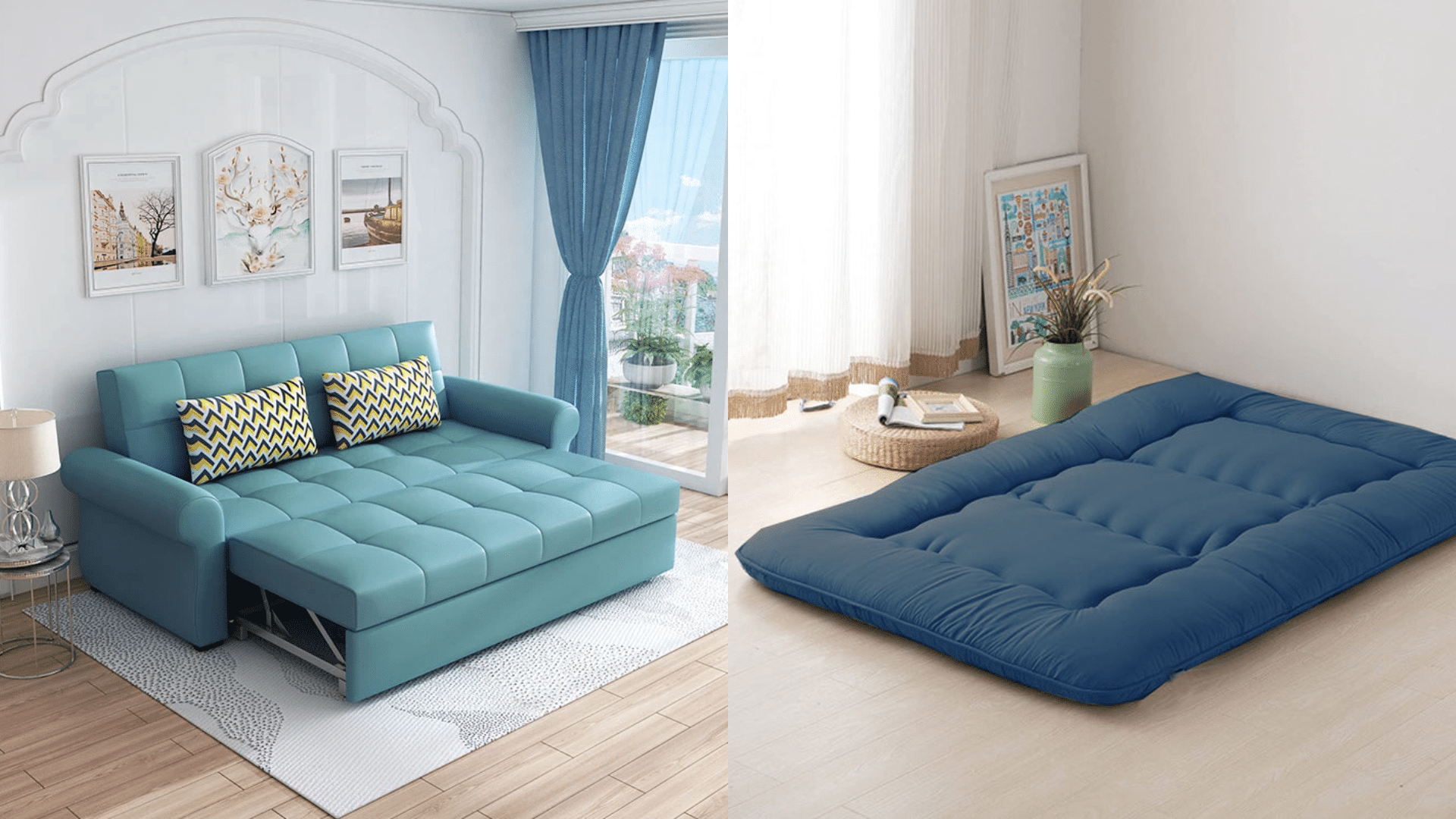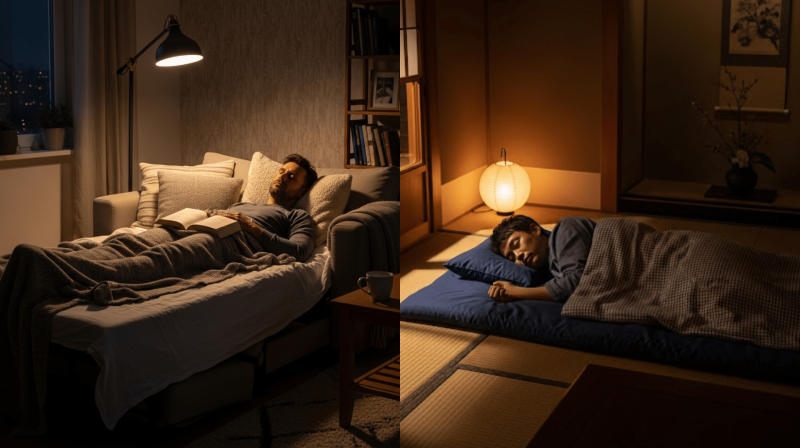I know how tough it can be to choose the right sleeping solution for your home.
You want something that works as both seating and a bed, but you’re stuck between a futon and a sofa bed. Both seem similar, yet they’re quite different in comfort, price, and practicality.
I promise to help you make the right choice for your specific needs and budget. After comparing dozens of options and testing both types myself, I’ve learned what matters when picking between these two.
In this blog, I’ll break down futon vs sofa bed, the key differences between futons and sofa beds. We’ll look at comfort levels, costs, durability, and space requirements.
By the end, you’ll know exactly which option fits your lifestyle best
Understanding Futon and Sofa Bed
What is a futon?
A futon is a versatile bedding originating from Japan, consisting of a thin, flexible mattress called a shikibuton and a duvet called a kakebuton, which are laid on tatami mats for sleeping. It can be folded and stored away during the day to save space.
In the West, futons typically refer to a mattress on a folding frame that serves as both sofa and bed, ideal for small living spaces.
What is a sofa bed?
A sofa bed is a multifunctional piece of furniture that functions as a sofa and can be converted into a bed. It typically features a frame and a mattress hidden beneath.
The seating cushions that unfold or slide out to create a sleeping surface. Sofa beds save space and provide a convenient sleeping option, ideal for small homes or guest rooms
Comparison of Futon vs Sofa Bed

Futons and sofa beds are both popular convertible sleeping options, each suited for different spaces and needs. When choosing between them, I consider comfort, style, functionality, durability, and cost to ensure I pick what fits my home best.
The following is the comparison of futon vs sofa bed.
1. Comfort and Functionality
When it comes to comfort and functionality, I find futons generally firmer, with a thinner mattress that often feels more like a supportive mat. Sofa beds, in contrast, feature thicker mattresses and a more traditional sleeping surface.
Pulling out a sofa bed feels like unfolding a real bed, whereas futons are more about quickly transforming furniture from couch to bed and back. For daily sleeping, I typically lean toward a sofa bed.
2. Design and Aesthetics
Design and aesthetics play a significant role for me. Futons tend to have a minimalist, casual look that fits well in dorms, studios, or informal spaces. Their frames and covers come in many colors and materials, allowing me to switch styles easily.
Sofa beds, meanwhile, often look like standard sofas, blending seamlessly into living rooms with a more polished and versatile design. I choose depending on my decor vibe and desired formality.
3. Space and Versatility
Space and versatility influence my decision considerably. Futons are lighter, easier to move, and perfect for tight spaces, often doubling as a makeshift sitting area or daybed. They’re ideal when I frequently rearrange rooms or need extra floor space.
Sofa beds, being heavier and bulkier, are less flexible but offer a more substantial furniture presence and provide a more permanent dual-use solution for overnight guests.
4. Durability and Maintenance
Durability and maintenance matter for the long term. Futons generally have fewer moving parts, which makes them easier to maintain, and covers are usually removable for washing, helpful for spills or pets.
Sofa beds, on the other hand, have mechanical elements that can wear down over time and are often upholstered, making cleaning trickier. If longevity and easy care are my priorities, I lean slightly toward futons.
5. Price and Budget
Price and budget are always deciding factors. I usually find futons much more affordable, with a wide price range that fits tighter budgets or temporary needs.
Sofa beds, due to their construction and comfort features, typically cost more but may be a better investment for a permanent guest room or regular dual use. I weigh the cost against how much I’ll use each piece and what I expect in terms of value for money
Pros and Cons of a Futon and a Sofa Bed
Futons and sofa beds are both versatile pieces of furniture designed to save space and provide extra sleeping options.
While they serve a similar purpose, each comes with its strengths and weaknesses that can influence your choice depending on your lifestyle and space needs.
| Feature | Futon | Sofa Bed |
|---|---|---|
| Pros | Lightweight and easy to move | Looks like a traditional sofa, more stylish for living rooms |
| Often more affordable | Usually has a thicker, more comfortable mattress | |
| Converts quickly from sofa to bed | Durable and supportive for long-term use | |
| Great for small spaces like dorms or studios | Provides a larger and more solid sleeping surface | |
| Cons | A mattress can feel thin and less comfortable for long-term sleep | Heavier and harder to move |
| May lack back and seat support for extended sitting | More expensive than a futon | |
| Less stylish, more casual appearance | Takes longer to convert into a bed | |
| Durability may be lower | Requires more floor space when unfolded |
Similarities Between Futon and Sofa Bed
A futon and sofa bed are both versatile pieces of furniture that serve as both seating and sleeping solutions. They’re ideal for small spaces or multipurpose rooms. The following are some key similarities between a futon and a sofa bed:
Dual Functionality
Both the futon and sofa bed serve two main purposes in my living space: sitting during the day and sleeping at night.
This dual function saves room and adds convenience, making them especially useful in apartments or guest rooms where space is limited.
Whether I have guests staying over or just want a quick nap, I can easily switch between modes.
Space-Saving Design
When I need to maximize my living area, I appreciate that both futons and sofa beds are designed to save space. They fit snugly against the wall as a couch and transform into a bed only when needed, freeing up floor space during the day.
This makes them practical choices for studio apartments or rooms that serve multiple purposes.
Variety of Styles and Materials
I’ve noticed that both futons and sofa beds come in a wide range of styles, colors, and materials. This means I can find options that match my taste and home decor.
Whether I prefer a modern look with sleek metal frames or a cozy vibe with plush fabrics, there are plenty of choices available in both categories.
Portability and Ease of Use
Setting up a futon or sofa bed is generally straightforward and manageable.
Since both are often designed with convenience in mind, I can convert them with minimal effort.
Their relative portability compared to larger, traditional beds also makes them easier to move or reposition within my home as my needs change.
Which One is for You?
Choosing between a futon and a sofa bed depends on my lifestyle and space needs. I appreciate a futon if I want something simple, lightweight, and easy to fold away daily.
It feels less bulky and offers a minimalist vibe, perfect for small apartments or if I like a traditional, floor-level sleeping option.
On the other hand, a sofa bed suits me if I want a more cushioned, sofa-like feel during the day and a fuller mattress for occasional guests. Sofa beds usually provide more comfort as a couch and better support as a bed, but often take up more space.
Ultimately, if I prioritize space-saving and simplicity, I lean toward a futon. If comfort and multifunctional style matter more, a sofa bed is my choice
The Bottom Line
After comparing a futon vs sofa bed, I can tell you that your choice comes down to your priorities.
If you need something affordable and don’t mind a firmer sleep surface, a futon works great. But if comfort is your main concern and you have the budget, a sofa bed will serve you better.
Think about how often guests will sleep on it. Consider your space limitations, too. Both options can transform your room, but they do it differently.
Measure your space first. Set your budget. Then visit a store to test both options yourself. Your back will thank you for taking the time to choose wisely.
What matters most to you, price or comfort? Let me know in the comments below.








